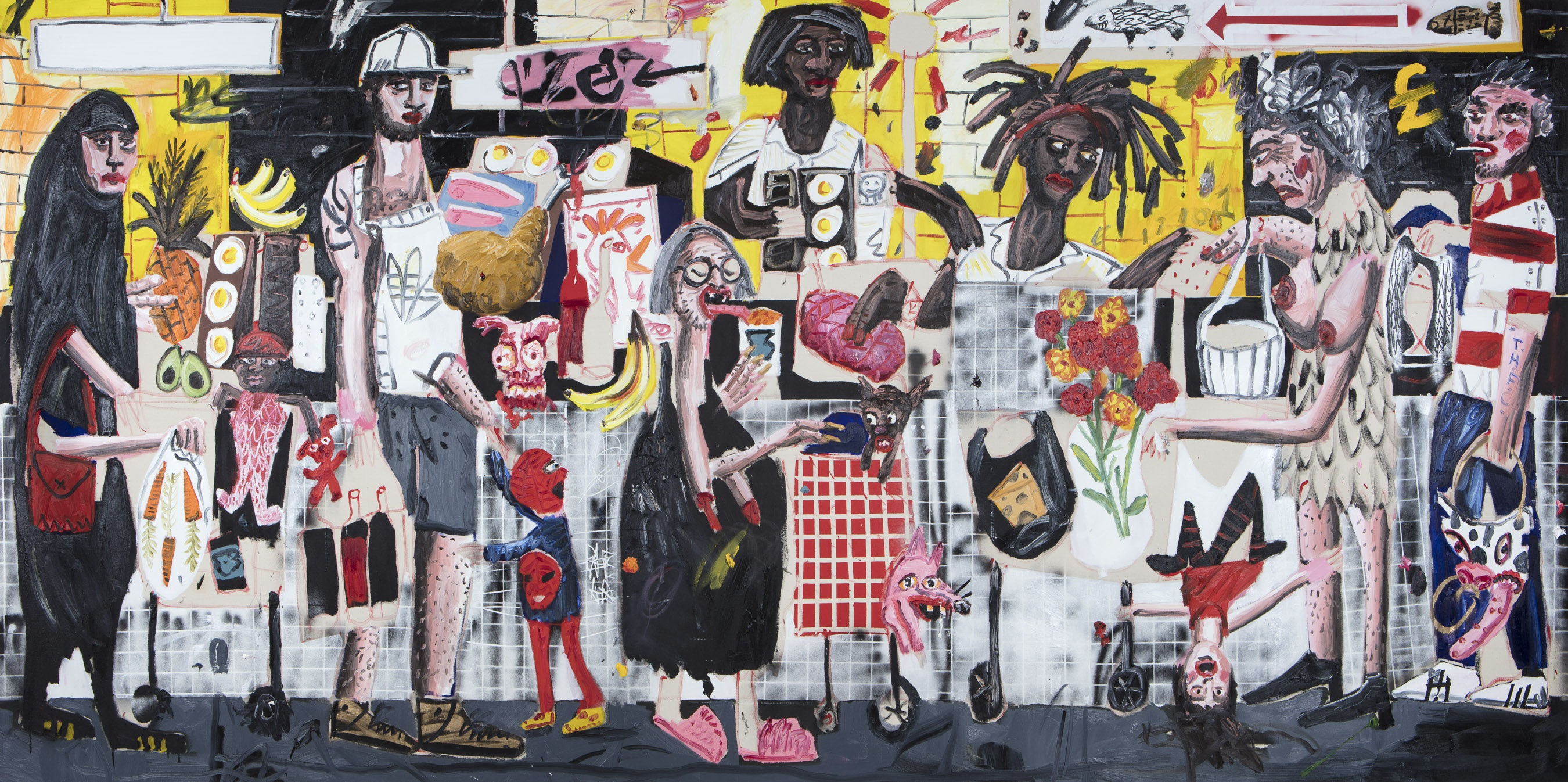09 March 2018 Dale Lewis’s ‘Fat, Sugar, Salt’ – his second solo show at Edel Assanti – depicts life in Brexit Britain as a distorted funhouse mirror: each new angle more grotesque and cruelly familiar than the last.

Dale Lewis, Club Tropicana, 2017, oil, acrylic and spray paint on canvas, 200 x 400 cm
Club Tropicana (2017) captures a teeming slice of life at a supermarket checkout. A woman in a hijab balefully pushes a shopping trolley, rubbing shoulders with a bearded white guy in Adidas sportswear. A bag of booze bottles clanks in one hand; his Spiderman-costumed kid hangs off the other. The mundanity of this scene explodes into febrile Technicolor, with shoppers mutating into leering gargoyles. A greying woman in pink fluffy slippers slurps at an opened tin; a butch woman with bristly legs, flashing her breasts, seems impervious to her child tumbling to the floor. The two black sales assistants look on, unblinking. In an atomized society in which class is the great undiscussed subject, consumerism appears to offer a strange kind of equality.
The grisly 2012 murder of EastEnders actress Gemma McCluskie is revisited in Regent’s Canal (2017). The waterway curdles into a macabre River Styx, flanked by leering teens in hoodies. Dismembered body parts drift along the canal, bobbing along with ducks and abandoned shopping trolleys. As in the other six paintings in the show, the brushwork is aggressive and under-worked and the canvas, measuring 2 × 4 m, monumental. Lewis has spoken of how he can cyclone his way through to a finished work in just a few days.
Devil’s Juice (2018) depicts a bar brawl accelerating into a Dionysian orgy, jacked up on mind-bending stimulants. A tangle of multiracial bodies form a violent daisy chain, the mouths of its subjects stretched into holes in which jouissance is indistinguishable from horror. The red and black-striped background disorientates. While racism still lurks at the margins of polite society, egged on by alt-right agitators, the huge canvas – bodies bent like swastikas – points to an ugly atavism underpinning fears of a racialized ‘other’.
Division, working its way through the body politic like dry rot, is a theme that runs throughout the show. Signature Collection (2017) depicts a gang of black youths hanging around on an estate. (Many of Lewis’s scenes are of his east London neighbourhood). Brooding and menacingly aimless, plastered in falsely optimistic Nike ticks, they smoke joints and pose on a moped (hung with an L-plate for comic effect). The scene looks almost affectionately at the camaraderie and posturing of gang life.
Lewis takes the pulse of modern Britain at its most moribund and pathological. Tensions boil and overspill in Maryland (2017): a seething allegory of religious conflict in our era of Daily Mail-style ‘Broken Britain’ scare quotes. Uniformed police – including one whose face has been stripped back to a grisly skull – seem to be trying to detain what appears to be an imam, streaked in blood. Women in burkas circle a police cordon. Another officer carries away a decapitated head on a stretcher; two ominous, flayed creatures dance around like a fever dream. Who is the victim and who is the aggressor here? Lewis jolts us out of the comfort of our cosmopolitan complacency. He picks at our prejudices like scabs.
Yet the artist isn’t afraid to turn his remorseless gaze on himself. Family Fortunes (2018) turns the cosiness of a Christmas dinner into a last supper of gnarly dysfunction. Lewis himself – in a paper crown, a cigarette jammed into his cracked grin – is served up as the main course. The goose gets its revenge, giving the carving knife the slip and returning as a guest. Around the table, bones pop out of limbs and a cat laps a jet of milk from the artist’s tweaked nipple.
On the evidence of this show at least, Perfidious Albion is in the rudest of health.


